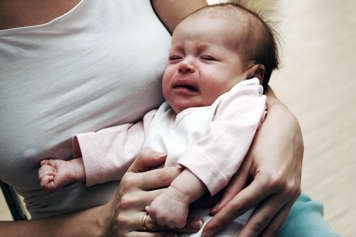Fever
In newborn babies and young infants three months of age or under, fever may be the first and only sign of a serious infection. If you notice a temperature that is even just slightly above the normal range, bring your newborn baby to a health-care provider as soon as possible. A normal temperature is less than 38°C (100.4°F).
Behaviour changes
A change in behaviour is often a sign of illness in babies. If your baby is ill, they may cry more or have a change in activity level. Generally, if your baby is active when awake, feeding well, and can be comforted when crying, small differences in activity level or crying are normal. However, if your baby becomes very sleepy or fussy, it may be time to see a health-care provider. Fussiness and decreased energy may be signs that an illness is present.
Decreased energy
Sleepy or listless babies have little or no energy. They sleep longer than normal, and they may be difficult to wake for feedings. When awake, they are drowsy or sluggish; they are not alert and they do not pay attention to visual stimulation or sounds. Decreased energy can develop slowly over time, and parents may have difficulty recognizing it.
Decreased energy may be a sign of a common infection such as a cold, or a serious type of infection such as meningitis. Decreased energy can be caused by heart conditions or blood diseases. There are numerous other conditions that can cause decreased energy, and decreased energy is usually one of many symptoms associated with many conditions. Therefore, if you notice that your baby is particularly lethargic or listless, bring them to their health-care provider for an examination. Treatment will depend on what is making your baby listless.
Fussiness
Crying is a baby’s only way of communicating. Over time, babies develop different cries depending on what they need: food, sleep, a diaper change, or a cuddle. Parents gradually learn to decipher their baby’s cries and respond accordingly. Usually, parents can console their baby by providing what they need. However, some babies may begin to cry inconsolably.
A baby who becomes very fussy and fretful, with long crying periods, may be ill or in pain. The baby may also become quite jittery or start to tremble. Fussiness may be a sign that your baby has gas, abdominal pain, an earache, or a viral or bacterial infection. The cause of your baby’s fussiness may simply be gas, but it might be something more serious. If your baby is fussy and cannot be consoled, bring them to their health-care provider for an examination. Treatment will depend on what is making your baby fussy.
When to see a health-care provider
See your child's health-care provider right away if you notice any of the following symptoms:
- fever (for babies 3 months old or younger)
- inconsolable crying
- listless or limp
- convulsions (seizures)
- fontanelle, the soft spot at the top of their head, is starting to swell
- pain
- purple splotches on their skin
- pale or flushed
- problems breathing
- refusal to breastfeed or drink from a bottle
- difficulty swallowing
- no pee in six hours
- continued vomiting or the vomit has become dark green
Your baby may show physical changes when their condition is serious or when their condition gets worse. Parents and caregivers can learn how to spot these signs in order to seek help from a health-care provider.
